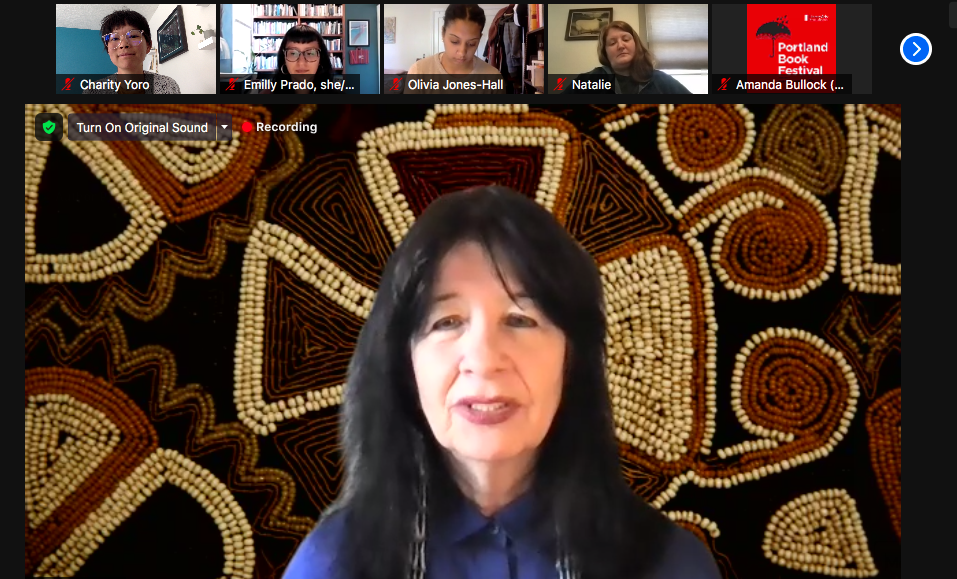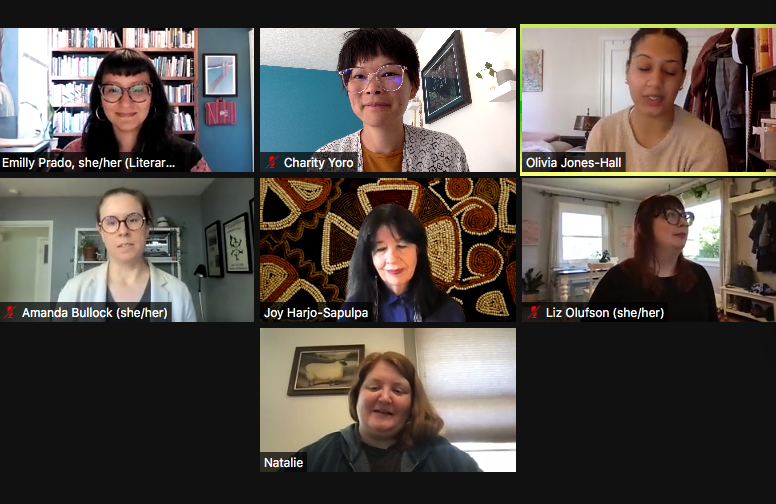United States Poet Laureate Joy Harjo met with students and educators from Milwaukie HS and Many Nations Academy. There were 45 attendees at the event. Harjo spoke to students about the ways in which poetry is a time machine, how she finds the words when she’s writing a poem, and how she became interested in poetry as a kid.
One student asked, “Do you have a favorite poetic device to use?”
“Sometimes I resort to a kind of form, or I’ll make a kind of form, as a kind of road map,” Harjo said. “But I always give myself permission to veer.” She talked about using the “Where I’m From” poem form, which is often taught as an assignment in writing classrooms. “Sometimes, I might need something to get me into a poem, but then I’ll quickly abandon it if I need to.”

Another student said, “I’m fifteen, and I remember reading this one poem by e.e. cummings called Buffalo Bill, and it was the first poem I ever read. That I noticed at least. I was wondering when you started being interested, noticeably, in writing and poetry?”
“I can tell you have an ear for poetry,” Harjo said. “And that’s kind of what marks e.e. cummings– we’re very sound-oriented people, and he has his own syntax and his own way of putting things together that throws you outside the usual. That’s what poets do. I go to poetry because I want something other than everyday language. You’re using words like the way you’d use color.”
“I paid attention to words when I was really young. When I was eight years old, I requested books of poetry for my birthday. But I assumed people who wrote poetry lived in England or in the Northeast, and that they were not Native kids. I think it’s changed a lot with your generation. You see a lot more different kinds of poetry. It wasn’t until I was an undergrad at the University of New Mexico that I heard Native poets.”
Harjo said she remembered reading the line from Emily Dickinson, “I’m Nobody! Who are you?/Are you – Nobody – too?” and she thought, “Whoa, she might be a stranger, and live in a part of the world — but she was another nobody, and far away, who loved language. That opened my ears. As well as my mother’s songs.”

“If you want to write a poem, where do your words come from? How long does it take you?” one student asked Harjo.
“That’s a profound question — where do the words come from?” Harjo said. “As a poet, I have my skills, because I practice. I learn words, I like to learn new words. I like to be around people who know things and people who are good orators, who have a command of language and meaning, as well as good songwriters. That’s all part of your tools. Knowing history, and how people tell it. But when I sit down to write, I have to get out of the way. One technique I use is I’ll start journaling. I start listening and writing things down. I think some of the words come from ancestors. Some come from things I’ve heard. I think of poetry as a time machine, because different times converge. Different voices. Even the voice of memory.”
Thank you so much to our educator partners at Milwaukie HS and Many Nations Academy, who made this visit possible: Ezra Whitman, Natalie Burton, and Nina Rockwell. Thank you to principals Carmen Gelman and Lisa Otero. Special thanks to Olivia Jones-Hall for her work coordinating this visit.
Buy When the Light of the World Was Subdued, Our Songs Came Through: A Norton Anthology of Native Nations Poetry, edited by Joy Harjo, here. Preorder Poet Warrior, Harjo’s new memoir, here.


